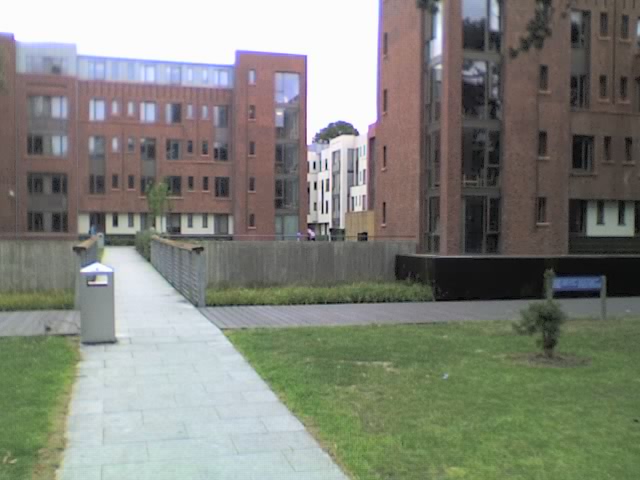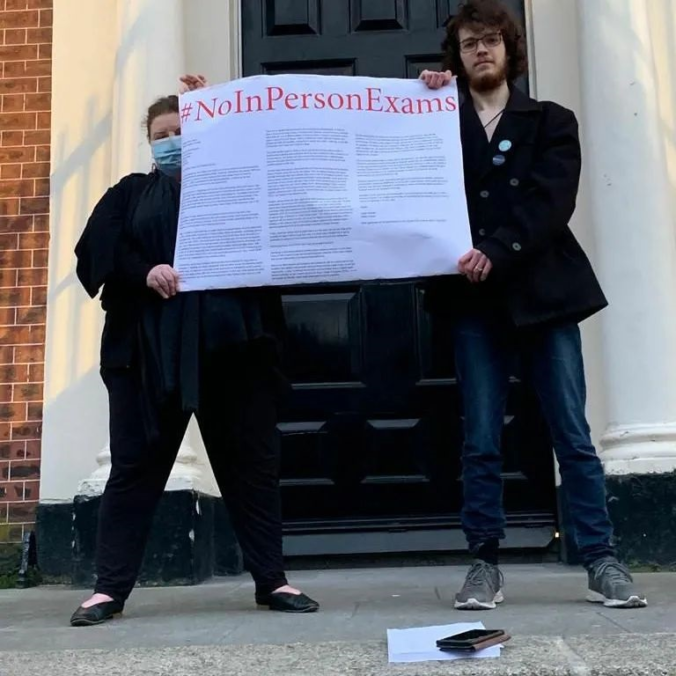In response to queries about a possible conflict of interest, Aarecent FOI and research by Students4Change has revealed that that Mr. Andrew Grainger, independent monitor of Trinity East, spent up to 6 years as an external member of the Estates Policy Committee. A tender was put out, and a recruitement company called Adaptive HMV got it, who then selected him to be the Independent Monitor. In other words, he went from external member (taking part in the meetings relating to Trinity East) to independent monitor of Trinity East.
Leftist students for social progress.
Month: December 2021
The OLRP Steering Committee was not consulted on the change of the location of the Interim Exhibition to College Park, a new FOI by Students4Change has found.
A separate FOI relating to all communications between Dublin City Council and College re. Interim Exhibition was rejected, and so was a recent FOI on the Science Gallery.
Please find the survey results here. They have been cleared of any private information and are being released here for easy access.
Perhaps the most shocking statistic is that 71.4% did not feel part
of the College community in 2020-2021 due to online learning, which suggests
that the student experience was greatly reduced. This is why there
is so much support for fee refunds.
48.1% said that the College is not adequately considering student wellbeing in its decision-making.
44.6% of students said that they are not properly taking care of their own mental wellbeing.
A few comments from students as follows.
“This semester has been ridiculous. We are inundated with lectures posted at different times every week and a workload that never lets up. People are anxious about the pandemic and our futures and we are not being given any kind of lenience or empathy. We are also being assigned 6 hour exams at the end of term. Obviously this year is the first to count towards our degree and requires some level of rigour but we are in an unprecedented situation and I think the college and the School of Maths are being absolutely unreasonable. There is enough pressure on us already – the 6 hour exams should be changed to 24 hour exams.”
| It’s impossible to recreate the college experience from home. This is not the fault of the college staff, who have made huge efforts to adapt to the current restrictions. Regardless, this semester has felt very isolating and lonely, which has been somewhat taxing on the mental health. This is just something we have to manage ourselves, and I don’t know how a college can help this in any way, but perhaps some small level of mitigating circumstances in terms of assessment. |
| We all understand the complexity of the situation and that faculty are in a similar position to us, but its honestly ridiculous to charge the same fee for this years study relative to others, seeing as we get, at best, 1/10th of the exeperience, aid and resources. Charging for gym fees is just disrespectful. The material was clearly made with in person participation/labs, not having altered that comes across as lazy and effortless. I can’t stress enough that we are all sympathetic to the situation we find ourselves in but the respect the college has shown students is laughable. Most professors have put in a great effort to provide us with the material we need especially considering everyone has a different situation to work out of, they have done a great job taking into account that we all have different needs and resources and giving everyone the flexibility needed during these times. The same cannot be said for the universitites efforts or the relevant departments. They have made no effort to bring us back in even though a large part of our course is dependent on labs, rubbing salt in the wound by allowing us to come in one day for a lab only to cancel it again the following week, the means are clearly there but the effort is not. The lack of aid, effort and communication from the university and relevant departments has been nothing short of disrespectful and incredibly dissapointing. I cannot stress enough that charging the same fee for an experience that isn’t even remotely similar has shown the true colours of the university and where their priotise lay, they don’t care for students or the situation we find ourselves in, lining their pockets seems more important, the only positive being that our very kind and caring professors are showing respect to us and the situation we are in. |
The college at this stage is actually a joke. We are not being supported whatsoever, I mean how much are the student nurses going through right now with none of your help. Having paid 3k in fees, I have had at least 1 class a day cancelled or pre recorded with no reply to any questions sent through email. Today for example I had a double class in a subject and this morning got an email that it was cancelled, and no not rescheduled, we got a 6 minute podcast from a different lecturer all together on a lecture with 192 slides?! I’m sorry but how does that make sense?! I have learned nothing this year. And for goodness sake answer your emails!!!!
| Trinity Education Project is not working – this is the first time I and many of my high-performing friends have suffered from burnout. Partially it is due to the pandemic but we believe it is mainly due to TEP. As a fourth year I have seen us go from 1 exam period per year (which didn’t work), to 2 exam periods per year (which was manageable) and now it feels like we have 4 with all of the course work being split into essays due during reading week and at the end of the semester. 4 is insane, and it isn’t working. Normally we would have a break to prepare for exams and then a break after the exams to decompress. Instead my reading week was the busiest week of term – I had five essays due alongside extracurricular involvement. I have seen people drop their extracurriculars this year because of the intense workload which is insane when nobody has a social life at the moment. Then immediately after reading week I had no time to relax and was launched straight back into the everyday intensity of tutorials and response papers. With exams this year happening after Christmas I have essays due from 7th January, it feels like we will have no time to breathe until I graduate in the summer. Especially this year, with the mental toll of the pandemic, it just isn’t manageable. The essay period feels like an exam period in and of itself, and we have four essay periods per year therefore four exams periods. Something needs to change because this is not sustainable – I would recommend looking to other universities – particularly with the idea of decreasing the amount of module in senior years. We should not be doing the same number of modules as we were doing in first year, and most other universities will only give their students in their final year a couple of modules which makes far more sense than the current model especially with the implications of TEP. |
| Online college does NOT work. There is zero atmosphere, buzz or energy associated with it. Even students who are suited to it (of which there are v few) feel blindsided by the college’s lack of compassion and support for students in this time. Paying full fees this year is unacceptable, when many lecturers are taking on substantially less labour, facilities are not in use, Less TAs have been hired. This is daylight robbery. Trinity’s incessant appearances on the news have been disgraceful, with certain leading staff members once again more concerned with the image of the college to the public and to tourists than to actual students. Trinity’s constant dishonesty with regards to allowing students on Campus in small groups is simply unacceptable, as is their refusal to commit to a solid outline for the term ahead, especially when so many students have been forced to travel back to their homes across the world due to covid-19. Online “learning” and this new reliance on technology does NOT work in favour of the student, and the Trinity Education Project is nothing more than a passion project by college board members which practically no one – teaching staff and students alike, finds of benefit. |
All JCR events have been banned by College until further notice due to an event going awry out of no fault of the JCR. Trinity Halls residents will be left without support during the holidays.
Here is our statement of support.
The week of the 20th is Christmas week at Halls. Christmas week is not a week to be discussing events – vendors, organize gazeebos, catering, etc. and for College to be giving permission. If the JCR are interested in planning Christmas event, a plan would have to be tabled this week on Tuesday at the Covid-19 Management Team meeting. The time for the JCR to bring events for approval is next week, but if this review takes place next week within the next couple of days (and presented on Thursday at the Trinity Living with Covid meeting) then the JCR will not be able to hold events because they will not have time to discuss and propose events. With respect, the JCR needs time to prepare events and not get distracted by such reviews. What it is is a perfectly timed review to halt the operations of the JCR, to act as an impediment for their operations, which will ultimately end up punishing students who stay over for Christmas.
In addition, the exam season might impede the review, and who knows when it will be complete because of that.
In past years, the JCR has organized multiple events per month. However, as demonstrated, this year’s JCR is being pressured and banned by College from organizing events. This is unacceptable.
While issues such as the housing crisis, sky-high tudent fees and underfunded College services affect all students, international students are especially hard-hit.
In 2020-2021, there were 2,509 registered non-EEA students at Trinity College Dublin, making up 13% of the student population. They account for 10.6% of the undergraduate population and 23.21% of the postgraduate population. They pay tuition fees up to €37,613, with most non-EEA fees being higher than €20,000. “The fees go up every year, ” says an international student.
On top of this is expensive student accommodation. Foreign students arriving into Dublin are practically forced either into public or private student accommodation due to not knowing the local rental market.
As reported in the Irish Independent (August 18th 2021), the cost of College can reach up to 14,000 euros a year. This has resulted in the growing inaccesibility of education. 4 in 10 college students say they struggle to afford living expenses, while 88% report worrying about money, according to a survey by SpunOut alongside the Irish League of Credit Unions in 2021.
According to the “Quarter 3 2019 Progress Report on the National Student Accommodation Strategy” report published by the Government of Ireland, from 2016 to 2019 a total of 8,229 bed-spaces were built for student accommodation across the country.
Out of those 8,229 bed-spaces, a staggering 6,900 representing 83% were privately financed. The Irish government has a heavy reliance on the private sector to build student accommodation with only 4 out of 32 sites being built by Universities.
More than 90% of these are only available for 840 € per month or more. This is the type of accommodation that international students are ‘forced’ into.
We all hear the stories of foreign students living in hostels or struggling to afford three meals a day. These issues, of course, affect all students, with the Students’ Union of University College Cork having to open a food bank in October 2021. However, international non-EEA students are affected even worse, due to the high tuition fees and accommodation costs.
In addition, international students have to pay for extra administrative procedures such as 300 € for Visa registration and for healthchare. Since international students do not have European health insurance, they must pay for General Practicioner (GP) visits at a rate of 65 € per session.
“We pay our 20ish thousand euros, plus an administrative fee which is around 250-300 euro for Trinity, then the 300 euros for immigration. Students from India need to pay more as they need an actual Visa. In addition, we are required to get Irish health insurance (even though we have one already), which is like 200-300 euro. We also have to have an Irish bank but have to take our loans in our home country so we loose thousands because of the exchange rate, ” says one student from the U.S.
“Lot of international students, especially American students, pay almost exclusively through student loans which are borrowed from the government and private corporations with massive loan interests. So for us we’ll be paying it off for the rest of our lives, because we don’t have debt forgiveness.
What’s upsetting is that the quality of the education is so poor for the high price that we’re paying, to be honest. And there’s no reduction in fees at all for the past 2 years of online lectures. Like I had to pay so much to travel back and forth from the U.S. to Ireland hoping that I would have in person classes and paying for accommodation here off-campus, because there weren’t enough spaces for international students on campus. We are only allowed to borrow a certain figure per year for our cost of attendance, but it doesn’t change to reflect the high costs of accommodation off campus. So last year I had to leave Ireland months early because I couldn’t afford to pay the remaining sum for my private accommodation, let alone feed myself.
In light of covid, we were essentially left to our own devices to “teach ourselves” more than ever, which I just rationally can’t justify spending 20k for, ” says an international student.
Recently, TCDSU allocated €30,000 from its Higher Education Authority fund to be allocated to support international students’ recovery from the pandemic.
Due to government underfunding, College have taken to using international students as cash cows. In 2019, Trinity College Dublin spent 1.4 million € on international student recruitement from all over the world. For example, there is the Trinity Centre for Asian Studies, aimed at recruiting Chinese students.
In fact, the funding model for specific Schools, the so-called the Baseline Budgeting Model (BBM) entails that however much an individual School manages to recruit in terms of student numbers is how much they’ll get in funding. As per the 2018-2019 Financial Accounts of the College, the College’s Global Relations Strategy 3, the strategy is to further internationalize the College by achieving a “growth in non-EU student numbers from 17% to 18.5% by 2025“.
The more diverse a University is, the better. But we shouldn’t treat our international students like second-class citiziens.
Due to their immigration status, and the lack of immediate family members and expensive access to the Irish healthcare system, international students are 2.5 times more likely to visit the College Health Service. Non-EEA use the psychiatrist 4.5 times more than Irish/EEA.
However, waiting times are long as College services are underfunded. It was reported that last year, during the build-up to exams, counselling services averaged wait times of 40+ days, and last month in November, a student would have to wait one month to get an appointment at the Health Service, according to an international student speaking to Students4Change who was told on a phone call with the Health Service.
“I can confirm having to use the College Health Service more than most. And it’s nearly impossible to get an appointment,” says another international student.
“And the college mental health services are just appallingly lacking. I had a mental health breakdown last year and I wasn’t able to secure appointments until 3 months later, and the neccesary medication until 4 months later,” they continue.
Due to 1.5 years of online learning, language barriers have intensified, which is why Students4Change and the GSU have asked for students to be allowed to use dictionary at in-person exams, as some of us have only ever done online with spell checkers, etc.
In order to get a Visa, one must pay the 300 € registration fee and prove that they have 3,000 € in their bank account to support themselves. The Visa that incoming international students have is the “stamp 2”.
There have been improvements and many are working on reforming the system . Last year, some international students could not go home for Christmas as there were very long waiting times at the Irish Naturalisation and Immigration Service (INIS) and since the government takes the passports of international students while their “stamp 2” Visas are being prepared. This has been fixed, but reveals a further pattern of discrimination.
On March 16th of last year, Trinity instructed all of its residents in Kavanaugh Court to vacate their rooms – giving international students just 48 hours’ notice – before admitting a day later it was “not in a position” to instruct those living in the privately owned accommodation to leave.
But many students living in Kavanagh Court had already booked flights home by the time Trinity acknowledged it did not have the authority to tell them to move out.
They were offered partial refunds, but this incident just shows how little consideration is given to international students as a separate cohort with their own issues and unique situations.
Issues still remain around Visa processing. For example, there are limitations on work. An international student may only work 20 hours per week during the academic term, and 40 hours per week during the holidays. During the holidays, they are a source of labour to make up for the loss as Irish workers go home to their families, whereas international students may not be able to or may not celebrate e.g. Christmas. There is also a black market which employs underpaid and over-exploited international students as per the Irish Council for International Students (ICOS).
In addition, after graduation, an international student can stay in the country for two years to find work. Once they find work and two years pass, their “stamp 1g” visas expire and companies have to ‘sponsor’ them (basically take responsibility for their stay, which they do not want to do). Therefore, they have to go back home despite having built a life here for years. A solution would be to have the years studying and working count towards citizenship (be “reckonable”).
PhD students by default face challenges due to not being on proper employment contracts (but casual contracts) at Universities for the most part, and are underpaid and lack job security.
Non-EEA PhD students (who are also not classified as workers despite being so) are intersectionally more affected by the issues that non-EEA international students face, and that PhD students face.
Students4Change has learned this after attending a meeting of the Non-EEA PhD Students’ Society. For example, non-EEA PhD students tend to be older, so they might have their spouses or children with them. Despite Non-EEA PhD students’ contributions to research and development in Ireland, their spouses are not allowed to work (so they have to e.g. sit at home for years) and their children are not allowed to go to public school, putting further financial pressure on the family as they are forced to pay for private schools.
“With the recent increase in rents, most of us have either to put in additional 20hrs per week to meet living expenses,” says one of their documents. They have a petition ongoing (linked here) – please sign and share.

László Molnárfi, Chairperson of Students4Change and President of the Graduate Students’ Union Gisèle Scanlon delivered the #NoInPersonExams open letter to
Minister Harris and Minister Donnelly at the Dáil today (1st of December 2021) at 4pm.
© 2025 Students4Change
Theme by Anders Noren — Up ↑





